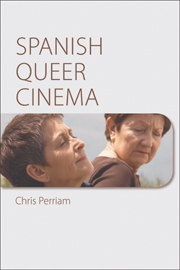1 - Queer
Published online by Cambridge University Press: 05 August 2013
Summary
Queer Reconfigurations of LGBT Cultures in Spain
In order to start drawing together the three parts of the title of this book, and of this section, and to elaborate on the issues alluded to in the Introduction, I begin by turning to precedents in discussions of British and French queer cinemas for placing the terms. Engaging in the now conventional struggle with introducing the word queer into a ‘“slippery” ménage[s] à trois’ such as British Queer Cinema, Robin Griffiths constructs the category as containing directors, actors [and films] ‘that … either directly address and/or seek to represent “lesbian”, “gay”, “bisexual” or “transgender” themes … or in some sense or another lend themselves to – or even openly solicit – queer modes of interpretation’ (Griffiths 2006a: 33). On the thematic front, to take that possible category first, Spanish queer cinema (as a catch-all term) might be said to be highly conventional, including as it does positive images (on which more later), cautionary tales of damage and pain as well as morale-boosting reconciliations, and frequent returns to the generally entertaining and instructive task of simply showing or dramatising the circumstances of LGBT experience. The very preference for the term ‘de temática’ (‘-themed’) by festival programmers or by retailers and distributors tagging their products (‘… gai’; ‘… lésbica’, ‘… trans’ – but rarely ‘… queer/bollo/marica’) suggests a pragmatic, content-driven strategy, a make-do approach to the tricky style and implications of the images in question.
- Type
- Chapter
- Information
- Spanish Queer Cinema , pp. 9 - 36Publisher: Edinburgh University PressPrint publication year: 2012



